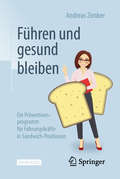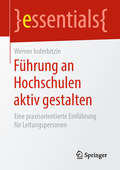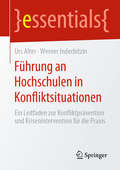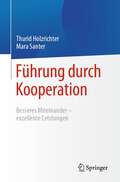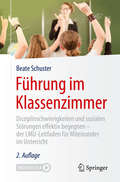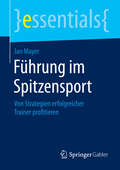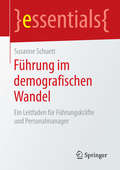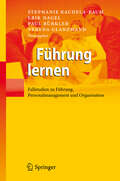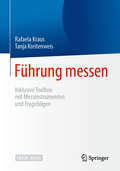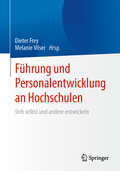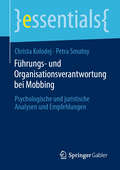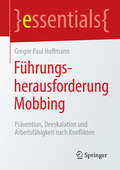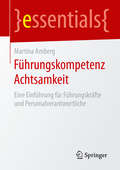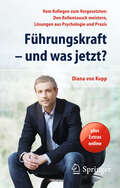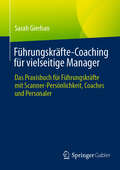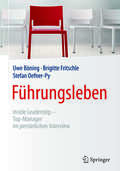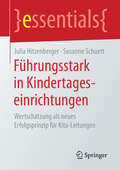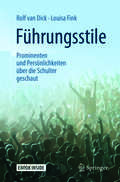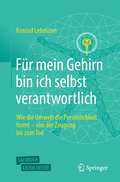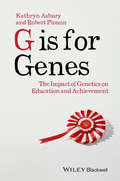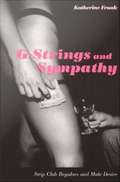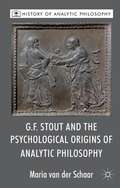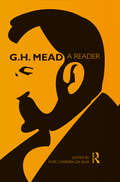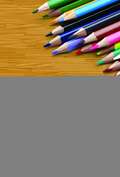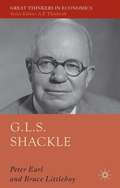- Table View
- List View
Führen und gesund bleiben: Ein Präventionsprogramm für Führungskräfte in Sandwich-Positionen
by Andreas ZimberFührungskräfte in Sandwich-Positionen erfahren in diesem Buch in 5 Schritten mit dem PsyGeMa-Präventionsprogramm, wie sie mit Stress und Belastung möglichst gesund umgehen können. Untersuchungen zeigen, dass Menschen in Sandwich-Positionen mit wenig Entscheidungsspielraum hoch gefährdet sind, psychische Probleme zu entwickeln. Wer darum weiß, kann zeitig gegensteuern und einen für sich angemessenen Umgang mit Rolle und Herausforderung finden. Die fünf Schritte: (1) Belastungen reduzieren, (2) mit Belastungssituationen konstruktiv umgehen, (3) gesundheitsgefährdende Einstellungen erkennen und ändern, (4) sich gesundheitsbewusst verhalten, (5) aus dem Teufelskreis austreten.Geschrieben für ... (1) Menschen in Führungspositionen, die Selbsthilfe im Umgang mit arbeitsbedingten psychischen Belastungen suchen, Stressfolgen und Erkrankungen langfristig vorbeugen möchten, (2) Therapeuten und Coaches, die nach geeigneten Beratungs- und Therapiewerkzeugen für psychisch belastete Führungskräfte suchen.Der Autor: Andreas Zimber ist Diplom-Psychologe, Personalentwickler (M. A.), Dr. phil. und Professor für Wirtschaftspsychologie. Er lebt in Heidelberg und arbeitet als Hochschuldozent, Unternehmensberater, Referent und Autor.
Führung an Hochschulen aktiv gestalten: Eine praxisorientierte Einführung für Leitungspersonen (essentials)
by Werner InderbitzinWerner Inderbitzin stellt in diesem essential in prägnanter Form dar, dass an Hochschulen ein gemeinsames Ziel entwickelt und der Weg dahin konstruktiv gestaltet werden kann, wenn wichtige Regeln beachtet werden. Von einem Praktiker für die Praxis geschrieben, geht er den folgenden Fragen nach: „Welche Art von Führung soll es sein? Welcher Führungsstil ist Hochschulen angemessen, welcher nicht?“ Führung an Hochschulen ist herausfordernd und oft frustrierend – aufseiten aller Angehörigen des Lehr- und Forschungsbetriebs. Der Autor möchte zu weiterführenden Überlegungen anregen und die konkrete Arbeit in der Praxis unterstützen.
Führung an Hochschulen in Konfliktsituationen: Ein Leitfaden zur Konfliktprävention und Krisenintervention für die Praxis (essentials)
by Urs Alter Werner InderbitzinDieses essential gibt Führungskräften an Hochschulen einen praxisorientierten Leitfaden zum Konfliktmanagement und zur Krisenintervention an die Hand. Dabei wird auf das Spezifische von Konflikten an Hochschulen fokussiert, weil die gängige Konfliktliteratur hier nur beschränkt weiterhilft. Leser/innen verstehen die speziellen Treiber von Konflikten in Hochschulen und erhalten konkrete Hinweise für Konfliktprävention und Umgang mit Konflikten. An ausgewählten Konfliktsituationen und -beispielen wird aufgezeigt, wie Führungsverantwortliche in einer Hochschulkultur lösungsorientiert und deeskalierend wirken können.
Führung durch Kooperation: Besseres Miteinander – exzellente Leistungen
by Thurid Holzrichter Mara SanterFührung ist herausfordernd und erfordert spezielle Kompetenzen, kluge Entscheidungen, angemessene Strategien und einfühlendes Geschick. Entscheidend ist, ob es Ihnen als Führungskraft gelingt, Ihre Mitarbeitenden mitzunehmen und eine funktionierende Zusammenarbeit aller Beteiligten zu erreichen.Das Buch „Führung durch Kooperation“ hilft Ihnen als Führungskraft erfolgreich zu sein, indem Sie die Kooperationsbereitschaft in Ihrer Organisation fördern. Es stellt Ihnen ein Führungsprinzip vor, das in besonderem Maß dabei hilft, Störungen und Widerstände in einem System zu identifizieren und diesen entgegenzuwirken und darüber hinaus das Miteinander positiv zu wandeln. Es bietet Ihnen wertvolle Erkenntnisse, um tieferliegende Gründe zu erkennen, warum manche Mitarbeitenden nicht im Sinne des Unternehmens agieren. Dadurch können Sie zielgerichtet eingreifen und Änderungen vornehmen. Präventiv kann es Sie unterstützen, Veränderungsprozesse erfolgreich zu gestalten, Konflikten vorzubeugen und Kommunikationsstörungen sowie Fluktuation von Fachkräften zu verhindern. Zielgruppen:Führungskräfte, Personalverantwortliche, Organisationsentwickler*innen und Berater*innen.Zu den Autorinnen:Thurid Holzrichter ist Diplom-Psychologin und Autorin mehrerer Bücher, Beraterin, Coach und Trainerin, sowie Gründerin des Netzwerkes HOLZRICHTER-BERATUNGEN. Der Schwerpunkt ihrer Arbeit liegt in der Beratung von Unternehmen, Bildungseinrichtungen sowie der Führungskräfteentwicklung. Sie ist unter anderem spezialisiert auf Generationswechsel in Unternehmen. Mara Santer ist Diplom-Psychologin und Mathematikerin, Beraterin, Coach und Trainerin, sowie stellvertretende Leitung des Netzwerkes HOLZRICHTER-BERATUNGEN. Sie berät Teams und Einzelpersonen in Unternehmen und Bildungseinrichtungen.
Führung im Klassenzimmer: Disziplinschwierigkeiten und sozialen Störungen effektiv begegnen - der LMU-Leitfaden für Miteinander im Unterricht
by Beate SchusterDisziplinprobleme, unmotiviertes Lernverhalten und soziale Störungen stellen ein zentrales Problem an Schulen dar. Der LMU-Leitfaden für Miteinander im Unterricht schlägt auf der Grundlage etablierten psychologischen Wissens konkrete, praxistaugliche Maßnahmen für typische Alltagssituationen (und mögliche Albtraumszenarien) vor, um die Dynamik hinter diesen Phänomenen besser verstehen, und diesen gezielter vorbeugen und begegnen zu können. Dabei liegt ein Schwerpunkt auf Ideen, die sehr „klein“ erscheinen und die Sie selbst umsetzen können, ohne dass Sie eine „geborene Lehrkraft“ sein oder mehr Engagement zeigen müssen, sondern indem Sie an den handhabbaren Stellschrauben ansetzen und so Ihren Einsatz zielführender gestalten.
Führung im Spitzensport: Von Strategien erfolgreicher Trainer profitieren (essentials)
by Jan MayerJan Mayer erläutert die zentralen Elemente erfolgreicher Führung im Bereich des Trainings von Spitzensportlern und -mannschaften. Der Trainer im Spitzensport hat eine sehr spezielle Rolle - sein Erfolg wird ausschließlich über den Erfolg des Sportlers oder der Mannschaft definiert. Dieses Essential beantwortet die Frage, wie Trainer kontinuierlich erfolgreich sein können, ohne dies auf Kosten der intrinsischen Motivation der Sportler zu erwirken. Gerade im Setting Spitzensport, bei dem es um die Führung von leistungsorientierten (Klein-)Gruppen geht, ist es weniger relevant, was der Trainer konkret macht. Vielmehr ist es das aus bestimmten Grundhaltungen heraus resultierende Verhalten des Trainers, das den kontinuierlichen Erfolg herbeiführen kann.
Führung im demografischen Wandel: Ein Leitfaden für Führungskräfte und Personalmanager (essentials)
by Susanne Schuett,,Wie Sie den Laden führen, wenn die Leute erst mit 75 in Rente gehen", so Peter Drucker einmal trefflich, ist die zentrale und zugleich schwierigste Management-Aufgabe der Zukunft. Dieses Essential unterstützt Führungskräfte und Personalmanager bei der Bewältigung dieser neuen Herausforderung - und zwar praxisnah und konkret. Es liefert eine kompakte Handlungsanleitung für ein effektives Führen im demografischen Wandel. Führungskräfte und Personalmanager haben jetzt die Chance, die schwierigste Lebenskunst im 21. Jahrhundert, unser neues Altern, im Sinne eines ,,Ready to Age" erfolgreich zu meistern, mitzugestalten und voranzutreiben.
Führung lernen
by Stephanie Kaudela-Baum Erik Nagel Verena Glanzmann Paul BürklerFür diese Fallstudiensammlung wurden 50 praxisrelevante, aktuelle und "typische" Fälle aus den Führungsetagen zu verschiedenen Themenfeldern der Personalführung aufbereitet. Im Vordergrund steht die Beschreibung alltäglicher Führungs- und Managementsituationen, d. h. konkreter Verhaltensweisen und Handlungsabfolgen von Führenden und Geführten in Non-Profit- sowie For-Profit-Organisationen. Kurzzusammenfassungen, Falleinstufungen, "Teaching Notes", Literaturempfehlungen und ein Stichwortverzeichnis verschaffen Dozierenden einen raschen Überblick.
Führung messen: Inklusive Toolbox mit Messinstrumenten und Fragebögen
by Rafaela Kraus Tanja KreitenweisDieses kompakte Fachbuch gibt Ihnen einen umfassenden Überblick über die wichtigsten Führungsansätze. Es enthält eine Toolbox mit mehr als 20 fundierten Messinstrumenten und Fragebögen, z.B. zu charismatischer, ethischer, narzisstischer oder psychopathischer Führung, die Sie auch für eigene Befragungen (z. B. Mitarbeiterbefragungen oder wissenschaftliche Studien) einsetzen können. Sie finden in diesem Werk Antworten auf Fragestellungen wie beispielsweise: Wie führt man Veränderungsprozesse zum Erfolg? Was macht authentische Führungskräfte so überzeugend? Ist es wirklich wahr, dass Frauen anders – oder sogar besser als Männer führen? Was macht toxische oder schlichtweg schlechte Führungskräfte so gefährlich? Lassen Sie sich anregen, Führungsverhalten in all seinen Facetten zu reflektieren, lernen Sie, wie man Führung messen kann und entwickeln Sie ganz nebenbei Ihre eigene Führungskompetenz weiter! Zielgruppen: Führungskräfte erhalten Inspiration und Orientierung für ihre eigene Führungspraxis, Studierende finden sich besser im breiten Feld der Führungsforschung zurecht und Praktiker aus dem Personalbereich können sich neueste Erkenntnisse der Führungsforschung aneignen. Zu den Autorinnen: Prof. Dr. Rafaela Kraus ist Professorin für Personalmanagement an der Universität der Bundeswehr München und Expertin für Leadership, Organisationsentwicklung und digitale Transformation. Tanja Kreitenweis ist wissenschaftliche Mitarbeiterin an der Universität der Bundeswehr München und forscht in den Bereichen Serious Gaming, Lernen, Change Management und Führung.
Führung und Personalentwicklung an Hochschulen: Sich selbst und andere entwickeln
by Dieter Frey Melanie VilserDer Hochschulalltag befindet sich im Wandel und stellt Führungskräfte und Mitarbeitende vor neue Herausforderungen. Dieses Buch vermittelt wertvolle psychologische Erkenntnisse, um diesen Herausforderungen zu begegnen. Dabei beantwortet es Fragen wie z.B.: Wie führt man? Wie schafft man Synergieeffekte in Teams? Wie wählt man gute Mitarbeitende aus? Wie führt man Mitarbeiter*innengespräche? Welche Feedbackkultur fördert Potenziale bestmöglich? Wie geht man mit Stress um? Basierend auf Trainings- und Beratungswissen für LMU Mitarbeitende erhalten Sie in diesem Buch langjährig erprobte alltagstaugliche Hinweise zum Aufbau wichtiger Kompetenzen wie Selbstführung, Mitarbeiter*innenführung, Personalauswahl und -entwicklung, Zeit- und Selbstmanagement, Stressmanagement und Achtsamkeit. Zielgruppen:Das Buch richtet sich an wissenschaftliche Mitarbeitende jeder Karrierestufe in Bildungseinrichtungen, an Professor*innen, Postdoktorand*innen wie auch Doktorand*innen. Im Mittelpunkt steht die kompakte Zusammenfassung des Kernwissens für eine gesunde und erfolgreiche Entwicklung der eigenen Potenziale sowie der Potenziale von Mitarbeiter*innen und Studierenden. Zu den Herausgeber*innen:Prof. Dr. Dieter Frey ist Leiter des LMU Center for Leadership and People Management und Mitglied der Bayrischen Akademie der Wissenschaften. Dr. Melanie Vilser ist wissenschaftliche Mitarbeiterin und Trainerin am LMU Center for Leadership and People Management.
Führungs- und Organisationsverantwortung bei Mobbing: Psychologische und juristische Analysen und Empfehlungen (essentials)
by Christa Kolodej Petra SmutnyChrista Kolodej und Petra Smutny zeigen Handlungsmöglichkeiten für Führungskräfte und Personalverantwortliche bei Mobbing in ihrem Einflussbereich auf. Mobbing wird als kontextbezogenes Phänomen vorgestellt, welches spezifische macht-, gruppen- und rollendynamische Prozesse aufweist. Es werden sowohl aus psychologischer als auch aus juristischer Sicht relevante Interventionen verdeutlicht. Das Buch wird mit praktischen Präventions- und Interventionstipps für Führungskräfte abgerundet, die aus Best-Practice-Beispielen von Führungskräften abgeleitet wurden.Die Autorinnen:Prof. Dr. Dr. Christa Kolodej, MA ist Pionierin der österreichischen Mobbingforschung und leitet seit 20 Jahren das Zentrum für Konflikt- und Mobbingberatung in Wien. Sie coacht Führungskräfte und Personalverantwortliche und unterstützt Unternehmen bei der Implementierung von Konfliktmanagementsystemen. Maga Petra Smutny, LL.M, ist Rechtsanwältin und eingetragene Mediatorin in Wien, Österreich, und beschäftigte sich als Richterin, Vorsitzende der Gleichbehandlungskommission und Autorin seit vielen Jahren mit den Themen Mobbing, Antidiskriminierung und Führungsverhalten.
Führungsherausforderung Mobbing: Prävention, Deeskalation und Arbeitsfähigkeit nach Konflikten (essentials)
by Gregor Paul HoffmannIn diesem Essential wird zunächst der Begriff Mobbing definiert und von anderen, ähnlich verwendeten abgegrenzt. Zudem skizziert der Autor die Entstehungsbedingungen von Mobbing-Geschehen und er formuliert unter Berücksichtigung der Konzepte der personalen und organisationalen Resilienz Schlussfolgerungen für die tägliche Führungsarbeit. Mobbing-Geschehen stellt immer eine Herausforderung für Führungskräfte dar. Im Zentrum der Aufmerksamkeit steht, wie Mobbing erkannt werden kann, wie Führungskräfte dazu beitragen können, die Arbeitsfähigkeit der Gruppe wiederherzustellen, und nicht zuletzt wie bereits präventiv gegen Mobbing gewirkt werden kann.
Führungskompetenz Achtsamkeit: Eine Einführung für Führungskräfte und Personalverantwortliche (essentials)
by Martina AmbergMartina Amberg legt in diesem essential dar, was sich hinter dem Begriff und dem Konzept „Achtsamkeit“ verbirgt, und umreißt Möglichkeiten, die sich dadurch im Führungskontext ergeben. Sie zeigt, dass Selbstkompetenz, Beziehungskompetenz und Veränderungskompetenz die Ebenen sind, die Führungskräfte für sich weiterentwickeln müssen, um zukunftsfähige Führungskompetenz zu erlangen. Eine zentrale Bedeutung kommt hierbei Achtsamkeit zu als innerer Haltung der offenen, nichtwertenden Aufmerksamkeit, die bewusst auf den gegenwärtigen Augenblick gelenkt wird. Globalisierung, technologische Entwicklungen und veränderte gesellschaftliche Rahmenbedingungen haben in den letzten Jahren Dynamik und Komplexität in Gesellschaft und Wirtschaft deutlich erhöht. Dadurch kommen klassische Führungskonzepte zunehmend an ihre Grenzen. Führung neu zu denken und zu gestalten, wird daher zu einer zentralen Bedingung für die Zukunftsfähigkeit von Unternehmen und Organisationen.
Führungskraft - und was jetzt?: Vom Kollegen zum Vorgesetzten: Den Rollentausch meistern, Lösungen aus Psychologie und Praxis
by Diana KoppDer Rollenwechsel vom Mitarbeiter zum Vorgesetzten ist eine der größten Veränderungen, die eine Berufskarriere bereit halten kann. Nicht wegen neuer fachlicher Anforderungen, sondern wegen zahlreicher, meist unvorhersehbarer Herausforderungen im psychologischen, kommunikativen Bereich! – Fühlen Sie sich auf diesen Rollenwechsel vorbereitet? Antworten Sie nicht zu schnell – schauen Sie lieber zunächst kurz in dieses Buch hinein! Denn es berücksichtigt verschiedene Persönlichkeiten und bietet Hilfestellungen, egal ob Sie eher vorsichtig oder forsch an die neue Aufgabe herangehen wollen.Das Buch ist in vier übersichtliche Hauptkapitel unterteilt: Selbstführung, Mitarbeiterführung, Umgang mit Vorgesetzten, Privatleben. – Denn dies sind die Bereiche, in denen frisch gebackene Führungskräfte Veränderungen erleben und auf unerwartete Stolperfallen treffen können. – Von der selbstbewussten Jung-Vorgesetzten, die ihre Mitarbeiter mit neuen Ideen überfordert, über den vorsichtigen Chef, der an seinen eigenen hohen Erwartungen verzweifelt bis hin zur hochveranlagten Oberärztin, die aufgrund langer Arbeitszeiten in den Konflikt mit der Familie gerät – sie alle finden Rat und praktische Tipps für den neuen Alltag. – Ganz praxisnah aufbereitet mit Fallbeispielen, Checklisten und Arbeitsblättern.
Führungskräfte-Coaching für vielseitige Manager: Das Praxisbuch für Führungskräfte mit Scanner-Persönlichkeit, Coaches und Personaler
by Sarah GierhanErfolgreiche Führungskräfte – vom Projektmanager bis zum CEO – mit „Scanner-Persönlichkeit“ (Tausendsassa bzw. Neo-Generalisten) haben oft die Herausforderung: Ihre vielseitigen Talente machen sie zu außergewöhnlichen Führungspersönlichkeiten, doch diese Vielfalt kann auch zur Belastung werden. Sie kämpfen beispielsweise mit Prioritätensetzung, Entscheidungen, Delegation sowie strukturiertem Selbstmanagement. Ihre Vielseitigkeit und hohe Selbstansprüche führen oft zu innerer Unruhe bis hin zu Frustration. Dieses Buch vermittelt praxisorientierte Ansätze, wie vielseitige Führungskräfte ihre Vielseitigkeit gezielt nutzen können, um erfolgreich und zufrieden in ihrer Rolle zu agieren. • Die Scanner-Persönlichkeit verstehen und nutzen: Wesen, Stärken und Probleme von Scanner-Führungskräften sowie Lösungen • Als Führungskraft erfolgreich: Führungsstrategien, gezielte Kommunikation, fokussierte Produktivität, effektive Selbstorganisation, Resilienz und Stressmanagement • Ansätze und Methoden im Coaching vielseitiger Führungskräfte: Spezifische Problemstellungen und Herangehensweisen • Empfehlungen für Unternehmen Das Buch richtet sich an vielseitige Manager, die sich weiterentwickeln wollen, an Personalverantwortliche und Vorgesetzte, die ihre Führungskräfte gezielt fördern, sowie an Coaches und Berater, die Tausendsassa betreuen.
Führungsleben: Inside Leadership - Top-Manager im persönlichen Interview
by Uwe Böning Brigitte Fritschle Stefan Oefner-PyDieses Buch macht die psychologische Wirklichkeit des Führungsalltags in Unternehmen ungeschminkt sichtbar, indem es Top-Manager und Führungskräfte unterschiedlicher Bereiche sehr persönlich – manchmal anonym – zu Wort kommen lässt: Managerinnen und Manager aus den Branchen Energie, Industrie, Banking, Politik, Beratung, Architektur, Universität und Schule, Küche, Kunst und Kirche berichten in ausführlichen Interviews sehr authentisch, manchmal etwas „ungeschliffen“, aber immer sehr ehrlich aus ihrem „Führungsleben“, von den ersten Erlebnissen mit dem Phänomen Führung über schwierige (Grenz-)Erfahrungen und Misserfolge bis hin zu Erfolgserlebnissen und ihren ganz persönlichen Lernerfahrungen. Herausgekommen ist ein Kaleidoskop an realen Führungsgegebenheiten, die den Leserinnen und Lesern realistische Impulse geben und mit denen sich alle, die sich mit Führung befassen, auseinandersetzen müssen, ob gewollt oder nicht. Ein Buch für alle, die geduldig etwas tiefer hinter die Kulissen der Führungsetagen blicken möchten – jenseits der üblichen Werbebotschaften, Führungsratgeber und Erfolgsrezepte.
Führungsstark in Kindertageseinrichtungen: Wertschätzung als neues Erfolgsprinzip für Kita-Leitungen (essentials)
by Susanne Schuett Julia HitzenbergerDieses essential unterstützt Kita-Leitungen bei der Bewältigung der Belastungen am Arbeitsplatz Kita, die heute eine besondere Führungsstärke brauchen, um ihre Mitarbeiter/-innen, betreuten Kinder und Eltern durch die Wertschätzungskrise zu führen. Nach dem neuen Erfolgsprinzip „Mit Wertschätzung zu Wertschöpfung“ zeigen wir fünf konkrete Schritte, wie Kita-Leitungen ihre Mitarbeiter/-innen binden, qualifizieren, gesund erhalten, motivieren und zufriedenstellen – für eine Verbesserung des „Lebens und Arbeitens“ und der frühpädagogischen Qualität in Krippe, Kindergarten und Hort.
Führungsstile: Prominenten und Persönlichkeiten über die Schulter geschaut
by Rolf Van Dick Louisa FinkIn einer Zeit, die von Wandel und Veränderung geprägt ist, ist gute Führung entscheidend für den Erfolg – von Unternehmen, aber auch in der Politik oder im Sport. Aber wie sieht gute Führung aus?Der Leser bekommt mit diesem Buch exklusive Einblicke in die Praxis der Führung – nicht nur in Unternehmen, sondern in viele gesellschaftliche Bereiche: Von Kirche und Kunst über Journalismus und Militär bis zur Politik. Rolf van Dick hat mit herausragenden Menschen gesprochen, die in ihren Bereichen zu anerkannten Führungspersönlichkeiten zählen. Dazu gehören der Dalai Lama, Sara Wagenknecht, Birgit Prinz, Wolfgang Niedecken oder Günter Grass oder der ehemalige Bundespräsident Roman Herzog. Im Gespräch ist er diesen Persönlichkeiten – oft in ihrem Zuhause – nahe gekommen und hat faszinierende Geschichten gehört. Dieses Buch bietet eine inspirierende Auswahl der spannendsten Gespräche, in denen immer der Frage nach den ganz persönlichen Führungsstilen der Interviewpartner nachgegangen wird. Von der provokanten Frage angefangen, ob Führung überhaupt notwendig ist, diskutiert Rolf van Dick mit seinen Gesprächspartnern, warum Führung häufig schief geht, worauf es im 21. Jahrhundert ankommt und welche Werte für den Erfolg Aktualität haben. Auch die Frage, ob man Führung lernen kann oder dafür „geboren“ sein muss, wird sehr vielfältig beantwortet.Das Werk liefert Einsichten und bietet Anregungen sowohl für erfahrene Manager, als auch an Führung interessierten Einsteigern die eine Inspiration für ihren (Führungs-)Alltag suchen.
Für mein Gehirn bin ich selbst verantwortlich: Wie die Umwelt die Persönlichkeit formt - von der Zeugung bis zum Tod.
by Konrad LehmannWieso bin ich der, der ich bin? Ist meine Persönlichkeit genetisch bestimmt? Ist mit der Zeugung mein Schicksal festgelegt? Oder habe ich eine Chance, mich aktiv und selbstständig zu verändern?Ja, sagen heute die systemische Neurobiologie und Psychologie: In allen Lebensstadien beeinflusst die Umwelt das Gehirn und damit die Entwicklung und Ausprägung unserer Persönlichkeit. Der Autor hat diesen Zusammenhang als renommierter Neurobiologe seit zwanzig Jahren erforscht, und aufwendige Humanstudien bestätigen es: Ob wir in einer vielfältigen und grünen oder in einer reizlosen Umgebung aufwachsen und leben, ob wir sozial geborgen oder entwurzelt sind, ja sogar subtile Einflüsse wie Licht und Geburtsmonat beeinflussen Gehirn und Persönlichkeit messbar und teils erheblich.Dieses Sachbuch zeigt Ihnen auf, dass Sie Herr oder Herrin Ihrer selbst sind, und wie Sie durch Veränderung der Umwelt das eigene Leben immer wieder neu in die Hand nehmen können. Wir haben die Möglichkeit, durch unsere Umwelt uns selbst zu verändern. Wir sind frei in unseren Entscheidungen und unserer Persönlichkeit und daher für unser Gehirn selbst verantwortlich. Das moderne Verständnis vom Gehirn vereint Freiheit, Offenheit und Verantwortung. Diese Idee nennt der Autor „Neuro-Humanismus“, und setzt sie gegen die Lehre von der Fremdbestimmtheit des Menschen.
G is for Genes: The Impact of Genetics on Education and Achievement (Understanding Children's Worlds #24)
by Robert Plomin Kathryn AsburyG is for Genes shows how a dialogue between geneticists and educationalists can have beneficial results for the education of all children—and can also benefit schools, teachers, and society at large. Draws on behavioral genetic research from around the world, including the UK-based Twins’ Early Development Study (TEDS), one of the largest twin studies in the world Offers a unique viewpoint by bringing together genetics and education, disciplines with a historically difficult relationship Shows that genetic influence is not the same as genetic determinism and that the environment matters at least as much as genes Designed to spark a public debate about what naturally-occurring individual differences mean for education and equality
G-Strings and Sympathy: Strip Club Regulars and Male Desire
by Katherine FrankBased on her experiences as a stripper in a city she calls Laurelton--a southeastern city renowned for its strip clubs--anthropologist Katherine Frank provides a fascinating insider's account of the personal and cultural fantasies motivating male heterosexual strip club "regulars. " Given that all of the clubs where she worked prohibited physical contact between the exotic dancers and their customers, in G-Strings and Sympathy Frank asks what--if not sex or even touching--the repeat customers were purchasing from the clubs and from the dancers. She finds that the clubs provide an intermediate space--not work, not home--where men can enjoyably experience their bodies and selves through conversation, fantasy, and ritualized voyeurism. At the same time, she shows how the dynamics of male pleasure and privilege in strip clubs are intertwined with ideas about what it means to be a man in contemporary America. Frank's ethnography draws on her work as an exotic dancer in five clubs, as well as on her interviews with over thirty regular customers--middle-class men in their late-twenties to mid-fifties. Reflecting on the customers' dual desires for intimacy and visibility, she explores their paradoxical longings for "authentic" interactions with the dancers, the ways these aspirations are expressed within the highly controlled and regulated strip clubs, and how they relate to beliefs and fantasies about social class and gender. She considers how regular visits to strip clubs are not necessarily antithetical to marriage or long-term heterosexual relationships, but are based on particular beliefs about marriage and monogamy that make these clubs desirable venues. Looking at the relative "classiness" of the clubs where she worked--ranging from the city's most prestigious clubs to some of its dive bars--she reveals how the clubs are differentiated by reputations, dress codes, cover charges, locations, and clientele, and describes how these distinctions become meaningful and erotic for the customers. Interspersed throughout the book are three fictional interludes that provide an intimate look at Frank's experiences as a stripper--from the outfits to the gestures, conversations, management, coworkers, and, of course, the customers. Focusing on the experiences of the male clients, rather than those of the female sex workers, G-Strings and Sympathy provides a nuanced, lively, and tantalizing account of the stigmatized world of strip clubs.
G.F. Stout and the Psychological Origins of Analytic Philosophy
by Maria van der SchaarAn investigatation of the influence of psychology and early phenomenology on the origins of analytic philosophy. This book is also of value for those interested in judgement, proposition, psychologism, logical realism, the problem of error, Gestalt theories, and tropes.
G.H. Mead: A Reader (Routledge Classics in Sociology)
by G. H. MeadThis book introduces social scientists to the ideas of George Herbert Mead (1863-1931) - one of the most original yet neglected thinkers of early twentieth century sociology. Mead is an exceptional case amongst sociological classics in that, until now, there has been no comprehensive reader of his work. As the first one-volume, comprehensive edited collection of Mead’s published and unpublished writing, this book fills this gap. It is the first to critically assess all of Mead's writings and draw out the aspects that are central to his system of thought. The book is divided into three parts (social psychology, science and epistemology, and democratic politics), comprising a total of 30 chapters - a third of which are published here for the first time. G.H. Mead: A Reader provides a unique and timely contribution to the understanding of this key theorist. It is essential reading for both undergraduate and postgraduate students in the fields of sociology, social psychology, philosophy of social science, social and cultural anthropology, and social and political theory.
G.U.I.D.E. Differentiated Instruction for Christian Educators
by Beth AckermanGuide to Differentiated Instruction for Christian Educators addresses how the Great Commission and teaching are unified through differentiated instruction. Teachers need to reach all students, including the diverse and struggling learners. Beth Ackerman encourages teachers and provides strategies for implementing differentiated instruction in their classroom.
G.l.s. Shackle
by Michael Jefferson Peter E. Earl Bruce LittleboyThis is an intellectual biography of G. L. S. Shackle, economic theorist, philosopher, and historian of economic theory. It explores how Shackle challenged the aims, methods and assumptions of mainstream economics. He stressed macroeconomic instability, and developed a radically subjectivist theory for behavioural economics and business planning.
